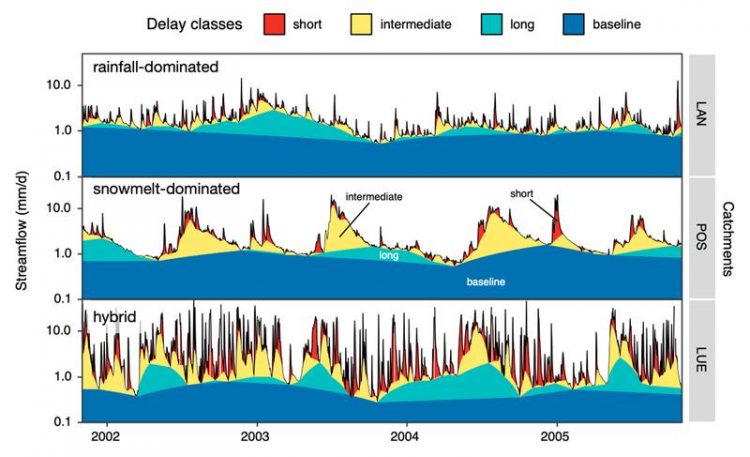Researchers are using a new method to determine how resistant rivers are to drought

Delayed-flow separation for three catchments from Switzerland with different streamflow regimes. Credit: Michael Stölzle
“We are seeing that different rivers react very differently to a lack of precipitation,” says the author of the study, Dr. Michael Stölzle from Environmental Hydrosystems at the University of Freiburg.
The heart of the newly-developed method is a filter algorithm that divides the streamflow into faster and slower components. If a catchment is dominated by fast components and surface runoff, the catchment is often less able to store water and is therefore more dependent on regular rain – and is thus less resistant to droughts.
If, on the other hand, most of the runoff components are slower – such as those from snowmelt or large groundwater reservoirs, the rivers will have longer stable streamflow even during prolonged dry periods. With the help of the filter, researchers can also determine after how many days a faster runoff component stops contributing significantly to a rivers’s total streamflow.
“Filtering the streamflow signal is not a new idea,” says Stölzle, “but it was often separated only into a fast and a slower component”. In this study, the hydrologists refined the existing filters to identify three or four streamflow components with different delays. This showed that alpine regions, for example, not only have snowmelt in summer as dominant component, but also have very stable runoff conditions in winter.
“From this we conclude that even in steep alpine regions there may be important subsurface storages which may ensure continuous runoff downstream,” says Stölzle.
The study used streamflow data from areas in Baden-Württemberg and Switzerland. Since only streamflow data are required for the new method, it can in principle be applied worldwide and can also be used in water management. The researchers suggest applying the method to other variables such as groundwater levels or using it to separate glacier and snowmelt components.
“In Baden-Württemberg, this method may in future help us to better understand how sensitive a catchment is to drought,” Stölzle explains. “A current survey among the lower water authorities has shown that both the irrigation demand and applications for water use will most likely increase in the future.”
Publication:
Stölzle, M., Schütz, T., Weiler, M., Stahl, K., Tallaksen, L.M. (2020): Beyond binary baseflow separation: a delayed-flow index for multiple streamflow contributions. In: Hydrology and Earth System Sciences 24, pp. 849–867. DOI: 10.5194/hess-24-849-2020
Contact:
Dr. Michael Stölzle and Prof. Dr. Kerstin Stahl
Chair of Environmental Hydrological Systems
University of Freiburg
Phone: 0761/203-67432
E-Mail: michael.stoelzle@hydro.uni-freiburg.de
kerstin.stahl@hydro.uni-freiburg.de
DOI: 10.5194/hess-24-849-2020
Media Contact
More Information:
http://www.uni-freiburg.de/All latest news from the category: Ecology, The Environment and Conservation
This complex theme deals primarily with interactions between organisms and the environmental factors that impact them, but to a greater extent between individual inanimate environmental factors.
innovations-report offers informative reports and articles on topics such as climate protection, landscape conservation, ecological systems, wildlife and nature parks and ecosystem efficiency and balance.
Newest articles

A ‘language’ for ML models to predict nanopore properties
A large number of 2D materials like graphene can have nanopores – small holes formed by missing atoms through which foreign substances can pass. The properties of these nanopores dictate many…

Clinically validated, wearable ultrasound patch
… for continuous blood pressure monitoring. A team of researchers at the University of California San Diego has developed a new and improved wearable ultrasound patch for continuous and noninvasive…

A new puzzle piece for string theory research
Dr. Ksenia Fedosova from the Cluster of Excellence Mathematics Münster, along with an international research team, has proven a conjecture in string theory that physicists had proposed regarding certain equations….



